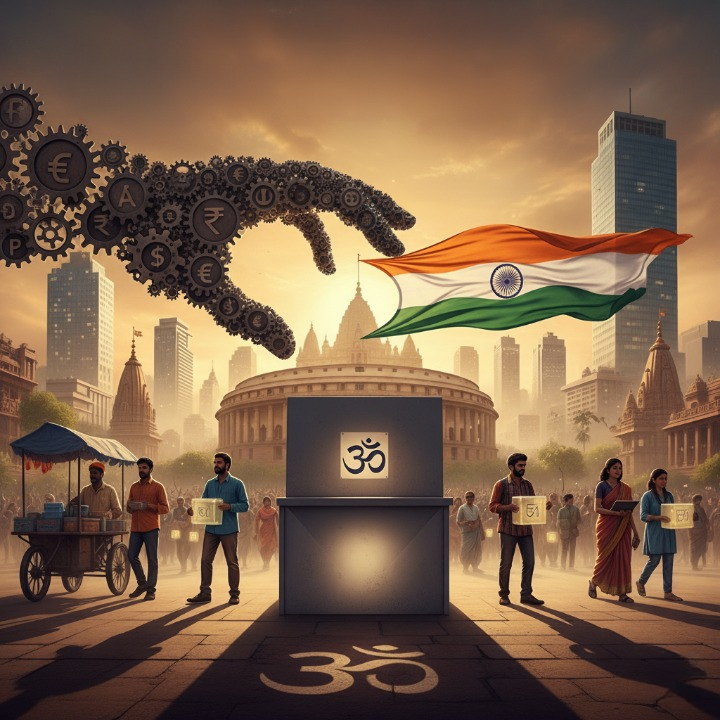
The Dichotomy of Rights: How Capitalism Shapes Democratic Freedoms in India
New Delhi, India, 2025 — Democracy promises rights, freedoms, and equality, but when intertwined with capitalism, these ideals can take on a more exclusive character. In India, where rapid economic growth has positioned it as a global powerhouse, the influence of capitalism on democratic freedoms has become both a driver of progress and a cause for concern. The dichotomy lies in how capitalism simultaneously empowers and restricts rights, often shaping them in favor of the elite while sidelining the marginalized.
This article explores the controversial interplay between capitalism and democracy in India, raising critical questions about whether the nation’s democratic freedoms are truly universal—or increasingly commodified.
The Rise of Economic Privilege in Democratic India
1. Wealth Inequality and Access to Rights
- Fact: According to Oxfam India (2023), the top 1% of India’s population controls over 40.5% of the nation’s wealth, while the bottom 50% owns only 3%.
- Impact: Economic privilege translates into political power, as wealthier citizens enjoy better access to education, healthcare, and legal recourse, while the poor struggle for basic rights.
- Controversy: Critics argue that capitalism has created a two-tier democracy where freedoms depend on financial status.
2. Corporate Influence on Policy-Making
- Reality: Political funding from large corporations often skews policies in favor of economic elites.
- Example: A report by the Association for Democratic Reforms (ADR, 2024) revealed that 72% of political donations in India came from corporate sources, influencing tax cuts and privatization policies that benefit the wealthy.
- Impact: While businesses thrive, public welfare initiatives like MGNREGA face budget cuts, undermining socialism’s promise of equitable resource distribution.
Capitalism’s Grip on Freedoms
1. The Privatization of Essential Services
The shift toward privatization in sectors like healthcare, education, and transportation has widened the gap in accessing democratic freedoms.
- Fact: According to the NITI Aayog (2024), privatized healthcare accounts for over 70% of India’s medical infrastructure, leaving rural populations underserved.
- Controversy: Critics argue that the commodification of essential services turns fundamental rights into privileges for those who can afford them.
2. The Erosion of Media Freedom
Corporate ownership of major media outlets often aligns narratives with capitalist interests, curbing dissent and critical reporting.
- Fact: India ranked 150th in the 2024 World Press Freedom Index, highlighting the impact of economic influences on journalistic independence.
- Example: Coverage of the 2024 elections focused on corporate-backed narratives, sidelining grassroots issues like environmental degradation and farmer suicides.
3. Environmental Exploitation for Economic Gains
India’s capitalist growth often comes at the expense of environmental rights, disproportionately affecting marginalized communities.
- Example: Mining projects in tribal areas displaced over 2 million people between 2020 and 2024, as per a Ministry of Tribal Affairs report.
- Controversy: Environmental activists argue that the right to a clean and safe environment is being sacrificed for industrial profits, creating a stark dichotomy in democratic freedoms.
Global Comparisons: Lessons for India
- United States
- Corporate lobbying significantly influences policy, especially in healthcare and gun rights.
- Lesson for India: Regulating corporate donations and ensuring transparency in policymaking can preserve democratic integrity.
- Nordic Countries
- Scandinavia balances capitalism with strong social welfare systems, ensuring universal access to rights like healthcare and education.
- Lesson for India: Prioritizing public welfare alongside economic growth can reduce disparities.
- China
- While not a democracy, China’s state-driven capitalism underscores the risks of unchecked economic control over individual freedoms.
- Lesson for India: Safeguarding freedoms requires striking a balance between state intervention and market efficiency.
The Path Forward: Reclaiming Democratic Freedoms in India
1. Ensuring Equitable Access
- Strengthen public welfare schemes like Ayushman Bharat to ensure healthcare access for marginalized communities.
2. Regulating Political Funding
- Cap corporate donations and mandate full disclosure to reduce undue influence on policymaking.
- Example: The Election Commission of India (2025) proposed reforms to limit anonymous donations.
3. Protecting Environmental Rights
- Implement stricter environmental regulations to ensure industrial growth does not infringe on the rights of vulnerable populations.
4. Promoting Media Independence
- Encourage diverse ownership of media outlets and protect press freedom to ensure balanced narratives.
Conclusion: The Dual-Edged Sword of Capitalism
Capitalism, while driving economic growth, poses significant challenges to democratic freedoms in India. Wealth inequality, corporate influence, and privatization have created a dichotomy where rights are often commodified, accessible primarily to those with financial power.
To bridge this divide, India must adopt reforms that prioritize equity, transparency, and inclusivity. Only then can democracy fulfill its promise of being a system that empowers all citizens, not just the privileged few. The future of Indian democracy hinges on addressing this dichotomy and reclaiming freedoms for every citizen, irrespective of their economic standing.



